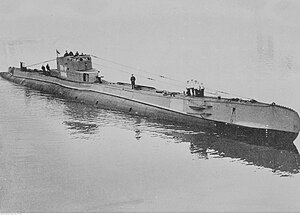Jan Grudziński (3 December 1907– May/June 1940) was a submarine commander of the Polish Navy during World War II.
Jan Grudziński | |
|---|---|
 | |
| Born | 3 December 1907 Kiev, Russian Empire |
| Died | 1940 May/June Onboard ORP Orzeł, North Sea |
| Allegiance | Poland |
| Service | Polish Navy |
| Years of service | 1921–1940 |
| Rank | Lieutenant commander |
| Commands | ORP Kujawiak ORP Orzeł |
| Battles / wars | World War II |
| Awards | Virtuti Militari (Silver Cross) Virtuti Militari (Golden Cross) Cross of Valour Navy Medal Distinguished Service Order |

Biography
editJan Grudziński was born in Kiev son of Stanisław and Regina Radecka.[1] After Poland regained independence, in late 1918 he settled with his parents in Lwów where in 1921 he entered the First Cadet Corps. After his graduating he entered the Polish Naval Academy and became ensign (podporucznik) in 1928.[1] In 1932 he served as executive officer on the torpedo boat ORP Kujawiak. He completed the underwater weapons training (1933–1934) then in 1937, the submarine navigation course.[2] In 1938 he was executive officer on the submarine ORP Sęp. Shortly before the start of World War II, he was transferred to the submarine ORP Orzeł.
During the Invasion of Poland, when ORP Orzeł was patrolling the Baltic Sea, Grudziński took command of the ship due to illness of the commanding officer Henryk Kłoczkowski. On 14 September 1939 Orzeł arrived to Tallinn where Kłoczkowski was taken to hospital. The next day, at the insistence of the Germans, Estonian military authorities boarded the ship, interned the crew, confiscated all the navigation aids and maps, and commenced dismantling all the armaments.[3] On 17 September Orzeł escaped and Grudziński decided to continue to patrol the Baltic Sea. After exhausting the possibilities of combat, Grudziński took the decision to join United Kingdom where he arrived on 14 October.[4]
On 21 October Grudziński was officially named commander of ORP Orzeł. After the necessary repairs in late 1939, the submarine undertook cruises in the North Sea. During these patrols, she succeeded in sinking the German troopship Rio de Janeiro and probably a patrol boat.[5]
Orzeł departed on her seventh patrol on 23 May, to the central North Sea. No radio signals were received from her after departure. Orzeł disappeared without a trace. It is likely that she hit a mine. 8 June 1940 was officially accepted as the day of her loss. Jan Grudziński perished with his crew.[6]
Awards and decorations
edit Virtuti Militari, Silver Cross[7]
Virtuti Militari, Golden Cross
Cross of Valour
Navy Medal (Medal Morski)
Distinguished Service Order
Military promotions
edit| ensign (podporucznik) | 1928 |
| lieutenant junior grade (porucznik) | 1932 |
| lieutenant (kapitan marynarki) | 1936 |
| lieutenant commander (komandor podporucznik) | 1940 (posthumously) |
References
edit- Julian Czerwiński; Małgorzata Czerwińska; Maria Babnis; Alfons Jankowski; Jan Sawicki (1996). Kadry Morskie Rzeczypospolitej. Vol. II. Gdynia: Wyższa Szkoła Morska. ISBN 83-86703-50-4.
- Stefan Łaszkiewicz (2008). Szum młodości. Gdańsk: Oficyna Wydawnicza Finna. ISBN 978-83-89929-01-3.
- Jurga, Tadeusz (1990). Obrona Polski 1939. Warsaw: Instytut Wydawniczy PAX. pp. 769–770. ISBN 83-211-1096-7.
- ^ a b S. Łaszkiewicz, p.11.
- ^ S. Łaszkiewicz, p.12.
- ^ Kuzak, Rafal (23 November 2013). "Orzeł wyzwolony. Brawurowa ucieczka z Tallina". ciekawostki historyczne (in Polish). Retrieved 20 February 2016.
- ^ S. Łaszkiewicz, p.14.
- ^ Edmund Kosiarz. Flota Orła Białego. Wydawnictwo Morskie, Gdańsk 1981. (ISBN 83-215-3241-1)
- ^ S. Łaszkiewicz, p.15.
- ^ Zbigniew Puchalski (2000). Dzieje polskich znaków zaszczytnych. Warsaw: Wyd. Sejmowe. p. 196.